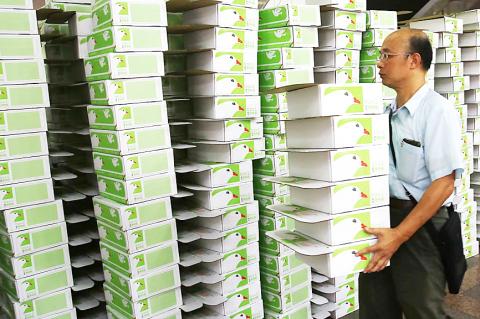The Central Election Commission is mulling criminal complaints against the Chinese Nationalist Party (KMT), which it suspects of forging signatures on a referendum petition to reduce air pollution, a commission official said yesterday.
The commission has determined that there is cause to suspect electoral fraud and officials would convene on Tuesday to decide the proposal’s fate, said the official, speaking on condition of anonymity.
The KMT submitted 497,302 signatures for the second phase of the referendum proposal, initiated by KMT Legislator Lu Shiow-yen (盧秀燕), but the commission had ruled 182,848 signatures, or 36.8 percent, invalid by Thursday last week, the official said.

Photo: CNA
More than 2 percent of signatures belonged to dead people, including some who died long before the petitions were signed, the source said, adding that a significant number of signatures were in the same handwriting styles.
Suspected use of dead people’s identities or and forged signatures were identified on 89,043 petitions, they said, adding that considering the number, the KMT might be liable under the Criminal Code.
The highest number of dead signatories were recorded in Taipei at 2,591, or 4.7 percent, followed by New Taipei City with 1,759 and Taoyuan with 1,058 signatures, or about 2.8 in both municipalities, the source said.
In Kaohsiung, 35,892 signatures out of about 71,000 — or about 50 percent — appeared forged, followed by 16,319 in Taipei and 8,672 in Tainan, or about 20 percent in those municipalities, they said.
There were 18,451 petitions with duplicate signatures, 13,409 petitions containing incorrect or illegible names, 12,205 with incorrect or illegible ID numbers and 34,299 with incorrect or illegible addresses, the official said.
It is unreasonable to assume that 60,000 people were confused about their name, registered address or ID number, and a far more likely explanation is that the errors stemmed from copying or forgery, the official said.
The commission confirmed that it would on Tuesday deliberate on how to proceed with the KMT’s referendum proposals.
It reiterated that it is an independent agency, and would follow the law and due procedure.
This story has been corrected since it was first published.

Alain Robert, known as the "French Spider-Man," praised Alex Honnold as exceptionally well-prepared after the US climber completed a free solo ascent of Taipei 101 yesterday. Robert said Honnold's ascent of the 508m-tall skyscraper in just more than one-and-a-half hours without using safety ropes or equipment was a remarkable achievement. "This is my life," he said in an interview conducted in French, adding that he liked the feeling of being "on the edge of danger." The 63-year-old Frenchman climbed Taipei 101 using ropes in December 2004, taking about four hours to reach the top. On a one-to-10 scale of difficulty, Robert said Taipei 101

A preclearance service to facilitate entry for people traveling to select airports in Japan would be available from Thursday next week to Feb. 25 at Taiwan Taoyuan International Airport, Taoyuan International Airport Corp (TIAC) said on Tuesday. The service was first made available to Taiwanese travelers throughout the winter vacation of 2024 and during the Lunar New Year holiday. In addition to flights to the Japanese cities of Hakodate, Asahikawa, Akita, Sendai, Niigata, Okayama, Takamatsu, Kumamoto and Kagoshima, the service would be available to travelers to Kobe and Oita. The service can be accessed by passengers of 15 flight routes operated by

Taiwanese and US defense groups are collaborating to introduce deployable, semi-autonomous manufacturing systems for drones and components in a boost to the nation’s supply chain resilience. Taiwan’s G-Tech Optroelectronics Corp subsidiary GTOC and the US’ Aerkomm Inc on Friday announced an agreement with fellow US-based Firestorm Lab to adopt the latter’s xCell, a technology featuring 3D printers fitted in 6.1m container units. The systems enable aerial platforms and parts to be produced in high volumes from dispersed nodes capable of rapid redeployment, to minimize the risk of enemy strikes and to meet field requirements, they said. Firestorm chief technology officer Ian Muceus said

MORE FALL: An investigation into one of Xi’s key cronies, part of a broader ‘anti-corruption’ drive, indicates that he might have a deep distrust in the military, an expert said China’s latest military purge underscores systemic risks in its shift from collective leadership to sole rule under Chinese President Xi Jinping (習近平), and could disrupt its chain of command and military capabilities, a national security official said yesterday. If decisionmaking within the Chinese Communist Party has become “irrational” under one-man rule, the Taiwan Strait and the regional situation must be approached with extreme caution, given unforeseen risks, they added. The anonymous official made the remarks as China’s Central Military Commission Vice Chairman Zhang Youxia (張又俠) and Joint Staff Department Chief of Staff Liu Zhenli (劉振立) were reportedly being investigated for suspected “serious